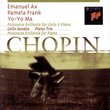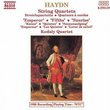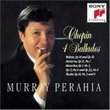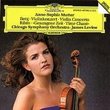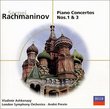| All Artists: Peter Hill Title: Berg/Schoenberg/Webern: Piano Music Members Wishing: 1 Total Copies: 0 Label: Naxos Release Date: 8/31/1999 Genre: Classical Styles: Chamber Music, Forms & Genres, Sonatas, Suites, Historical Periods, Classical (c.1770-1830), Modern, 20th, & 21st Century Number of Discs: 1 SwapaCD Credits: 1 UPC: 730099487023 |
Search - Peter Hill :: Berg/Schoenberg/Webern: Piano Music
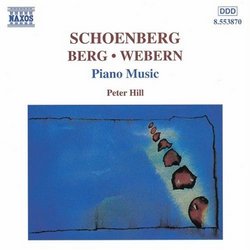 | Peter Hill Berg/Schoenberg/Webern: Piano Music Genre: Classical
|
Larger Image |
CD DetailsSimilarly Requested CDs |
CD ReviewsIn Its Way, a Kind of Nostalgia for Post-Romanticism Karl Henning | Boston, MA | 09/27/2001 (5 out of 5 stars) "My five-star rating is partly to balance the three-star review, wherein the reviewer's only grievance was a technical problem on his copy. My copy suffers no such high-pitch difficulty.But the recording itself deserves five stars. Peter Hill gives great performances of this collection of short piano pieces which, for all their brevity, make inordinate demands of the pianist ... they are infrequently performed, largely (if not solely) because of the outsized "effort-to-musical-reward" ratio. It is a lot of effort to put in, for a few minutes of such seemingly wild pianism, that it is far more likely to puzzle an audience, than to please them.Frank Behrens is a little misleading here: less than half the music on this disc is twelve-tone music, strictly speaking. The Berg Sonata, and the Schoenberg Opp. 11 & 19 were composed before Schoenberg developed his twelve-tone thinking; and Schoenberg worked out the 'system' while he was composing the Opp. 23 & 25. And, even after twelve-tone was "set" (as it were) in Schoenberg's mind, he did not absolutely always write within the system.Most of the music on this disc is, contrary to expectation, very Romantic -- especially compared to the pianism of post-Schoenberg composers in the 1950s. Not the large-scale, effusive Romanticism of (say) Wagner and Mahler, but a fusion of the brief aphoristic pianism of Schumann and Brahms, with a post-Romantic tonal restlessness which Schoenberg regarded as simply taking Wagner and Mahler to "their logical conclusion."Frank is right, in that the music is not exactly "tuneful"; but then, a good deal of Wagner's sound-world is not all that tuneful. It is peculiar to describe this music as "daring," when almost all of it was written well before the second World War; almost anything written by the admirers of Schoenberg and Webern during the decade following the end of the war, makes these piano morceaux seem tame. Tame in an entirely welcome manner." I've owned Pollini and Uchida paul best | new orleans | 02/11/2006 (5 out of 5 stars) "in the Schoenberg, both are good. But I much prefer this Peter Hill. I rarely use the word definitive, but in this case that descriptive applies. Everything about this guy's balance of tech and poetic understanding is alive here. One thing I like especially well is that Hill's ability to make this music more refined classical sound and much less of a jazzy image. For a jazzy approach try Pollini. PLUS YOU get the incredible Berg sonata and Webern's enchanting variations. BIG bonus'. 79 minutes of delightful music. " Hard pieces played well... Mark Grindell | Shipley,West Yorkshire | 02/11/2004 (5 out of 5 stars) "I think that the word hard could only be applied to the technique and skill required to play the pieces.I had a recording of the Schoenberg by Maurizio Pollini, and although it was good, this recording by Peter Hill is very clear and was done with a great deal of care. There is no distortion and no over loading at all, which is a hazard for these pieces.I have been aware of all of these compositions by reputation for years, but only started playing bits of them recently. This material are for many people too hard, but this complexity has almost certainly percolated into the conciousness of most people watching films of any sort - I would be prepared to stick my neck out, and say that there is a strong overlap between the intentions of say, Carla Bley and Dave Brubeck as regards the suspension of tonality, or at least, it's possible abolition.In particular, Dave Brubeck's publishers issued a collection of Nocturns a while ago. It took me a couple of years picking a few of these and trying to get a feel for what they were really supposed to sound like. In the end, I had to cheat, and resort to a few rather obscure recordings of the pieces played in a quartet setting, quite a different context from solo piano, to get a feel for them at all. I suspect that Op11 is a lot less ambiguous than that, and as I've been slowly trying to get a grip on some of this, it's been very rewarding and become very clear.I do wonder now what we all mean when we say the word "atonal". I suspect that there's precious little chance of perceiving any such thing, as our apparatus for picking up relationships, harmonic and structural, are so powerful that in fact all we can do is to play games with these kinds of pieces, avoiding settling down like a bird fluttering around a while before finally settling down on a branch. Some folks would say that this is all tosh and what you think was intention was accident. That may posibly be the case with Xenakis and Babbit, where at least Xenakis is practically using the laws of chance to construct everything. But if you were really honest, that has nothing to do with this material, and is a much later development. Ignore the Berg at your peril, it's brilliant, and incisive and the fact that it is theoretically atonal is irrelevant, it's just marvellous. Op11 and especially Op33 is just whistful jazz, the sort of thing that you would hear mid way in a Barbara Thompson concert... I'm still learning about this. This is definitely music from the heart, and excellent. Anyone who can play this stuff, please get in touch!"
|

 Track Listings (29) - Disc #1
Track Listings (29) - Disc #1
